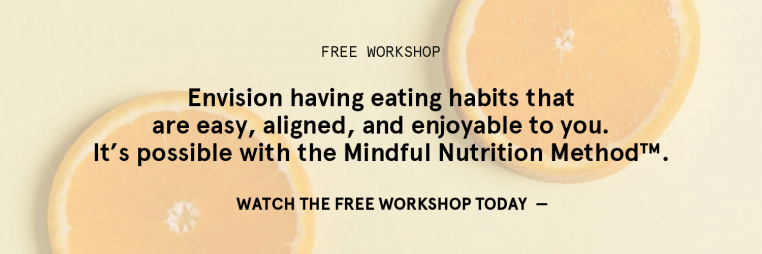Think about all of the times you’ve made a decision, a choice or even a promise to yourself that would help you achieve your health goals.
Maybe you’ve decided to cook dinner every night or to get to the gym on Monday morning. How many times have you gotten to the point of implementing the new habit or behavior change, and simply thought, “eh, not today”.
When you know exactly what to do, how to do it, and when to do it, but it still just isn’t working, accountability is the last piece of the puzzle that will get you to the finish line.
The 2 Types of Accountability You Need to Reach Your Health Goals
So, now that we know how important staying accountable is, how do we actually do it?
I’m going to show you how to build accountability with yourself, and how to create accountability with others so you can follow through on your health goals.
Accountability is twofold.
1. Internal Accountability
We first and foremost want to stay accountable to ourselves — internal accountability. When no one is around to see you or acknowledge your actions, internal accountability is the little push that gets you out of bed when you’re cozy and craving that bit of extra sleep.
The tricky thing here is that some people naturally have a lot of internal accountability, while others don’t naturally have as much.
Those who don’t have as much will need to practice cultivating more of this for themselves. For example, members of our Mindful Nutrition Method™ program go through exercises right when they join that help them build a stronger sense of internal-accountability.
However, even when developing a stronger sense of internal accountability, for those who don’t have as much natural, that’s where external accountability is really helpful.
2. External Accountability
External accountability means staying accountable to others. When you know someone else is checking in with you, supporting you, and eager to hear about your progress, you almost feel a sense of obligation to follow through for them.
A relatable example of this may be team sports. Growing up, did you find it easy to always show up for your sport’s practice because your team and coach were expecting you to be there? That’s external accountability.
This external accountability is often missing from so many people’s journeys because it’s something they have to seek out and ask for, either with a friend or professional.
We provide our members Mindful Nutrition Method™ program external accountability through weekly check-ins, group coaching calls, practice labs, a private member community, along with lessons on how to build more external accountability outside of the program.
It’s a combination of the two — internal accountability and external accountability — that has been proven to allow you to stay accountable throughout your life and reach the health and wellness goals you set for yourself (1).
Which of the two types of accountability do you feel like you need more of in your life?
How To Stay Accountable To Yourself
Let’s start by getting that little voice in your head to start motivating you to stay accountable.
1. Write Down Your Health Goals
We’ve said it once and we’ll say it again — write down your goals! Whether you’re a fan of planners and calendars or would rather a journal, writing down your goals has been proven time and time again to increase your chances of success.
More specifically, recent research has shown that we’re about 40 percent more likely to succeed if our goals are written down (2). Who doesn’t want an extra 40 percent chance of success!
When recording your health goals and ambitions for accountability, be specific and be realistic. If this is your first go at maintaining an exercise schedule, starting off by committing to seven days per week of intense exercise probably isn’t the best way to proceed. Start slowly and build your way up!
Additionally, if you’re going to exercise, what kind of exercise are you going to do? Is there a specific class you’ll take? If so, what time does the class start? The more specific you are, the clearer the message is and the easier it is to adhere to.
Tangibly seeing your goals in front of you makes them real and concrete, undoubtedly increase your chances of remaining accountable.
2. Take It Step By Step
Let’s say you’ve always wanted to meal prep your meals but you just never seem to follow-through with your plans. Not only should you write down your goal of meal prepping, but also map out a schedule for when and how it will take place.
Take the time to create a schedule when you’re motivated and have decided to implement the new habit, behavior change or goal. This takes care of all of the heavy liftings ahead of time. That way, when it comes time to actually start the meal prepping, you already know what you have to do and when to start.
Be specific with your schedule; what day will the meal planning take place? Do you need to set a reminder so you don’t get sidetracked and forget? Know yourself and acknowledge your strengths and weaknesses. The more thought you put into the activity ahead of time, the more accountable you’ll be in the present moment.
3. Be Honest With Yourself
As cliché as it may sound, honesty truly is the best policy.
It’s easy to make excuses and rationalize your choices when you’re simply talking to yourself in your own head. Yet when things don’t go as planned or if you find yourself in a situation where you weren’t able to stay accountable, be honest with yourself.
Use that time to determine what went wrong, why you didn’t stay accountable and what you can do differently next time. We’re human, we all make mistakes. We just want to be sure to learn from them and move forward rather than repeat them and standstill.
4. Seek Out The Knowledge You Need
In order to stay accountable and stick to your decisions, you need to have the proper knowledge. Whatever the subject may be, educate yourself so you know how to properly apply yourself.
Educating yourself may involve doing some research on your own, but oftentimes your best bet is to work with a professional you can trust. Always seek out a credentialed, trustworthy individual within the given field.
Working with a professional can also give you an extra layer of accountability, which we’ll discuss next.
How to Use External Accountability to Achieve Your Health Goals
Research has shown that in order for us to truly remain accountable, we often need the support of others.
1. Share Your Goals
Whether it’s a professional you’re working with, your best friend, significant other or maybe even a workout buddy at the gym — talk to them about your goals! The more we verbalize and discuss our plans, the more responsible we feel for accomplishing them.
The next time you’re making a lifestyle change, add a new step to your daily routine or set a new goal for yourself, tell someone else about it. Once again, be as specific as possible! Tell them that you’re going to the gym at 6:00 am on Friday or that you’re trying to budget $50 per week to save up for that special trip.
Then ask them to check-in with you to see how it’s going each week or month.
By both verbalizing and writing down our health goals we feel compelled to remain accountable and see it through to the end.
We do this inside The Mindful Nutrition Method™ program, where we have our members share what they’re working on each week so that the community and the coaches can hold them accountable and check in with them.
2. Be Honest With Others
Once you tell someone you’re going to do something, isn’t it difficult to tell them that you didn’t actually follow through with it when they ask? This is one of the reasons why talking about your goals with others is so important for accountability.
We also need to make sure that we’re honest. When things don’t quite go the way you had hoped and a friend asks why you didn’t follow through, always, always tell the truth. Be honest with them. If you were simply feeling unmotivated – say that! The more you acknowledge your weaknesses and weak points, the more likely you are to address them moving forward and prevent the situation from repeating itself.
It can be difficult, but sometimes it takes setting your ego aside to reach a state of complete accountability.








